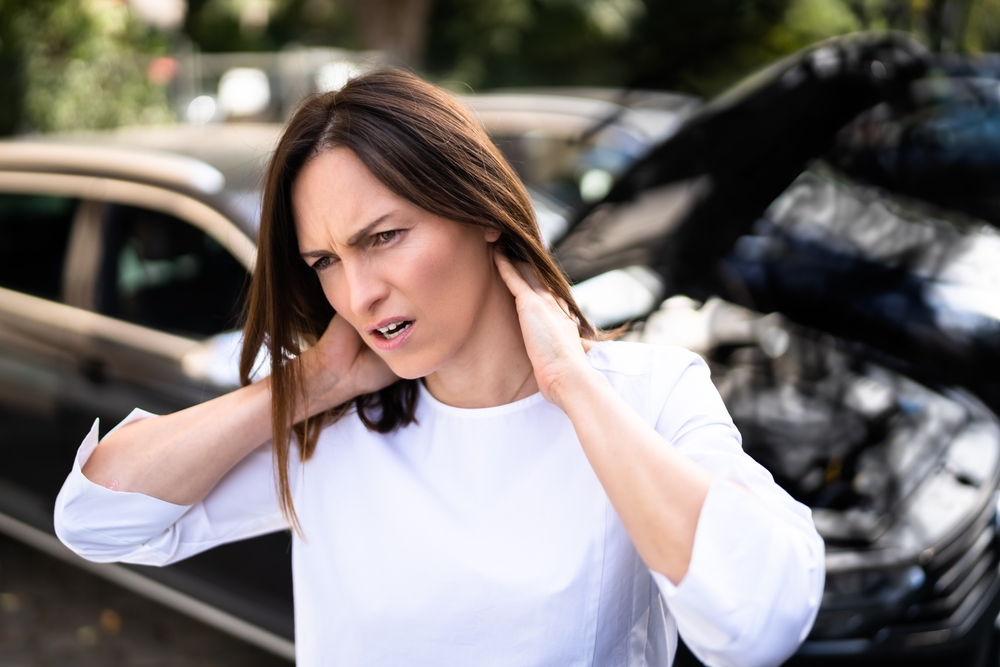Neck and back injuries frequently occur following automobile accidents. In fact, 90 percent of injuries obtained in rear-end crashes are neck injuries. Feeling sore in one or more places is to be expected after an accident, however, if rest and time do not resolve the pain, further treatment is likely necessary. A physician can assess and diagnose your injuries to guide you to the proper treatment before chronic pain sets in.
If you are experiencing neck pain or back pain after a car accident, it may be time for you to seek professional medical care for pain relief.
Potential Causes for Neck and Back Pain After Car Accident
The cervical, thoracic, and lumbar vertebrae of the spine consist of bones, muscles, nerves, tendons, and ligaments that extend from your neck to your pelvic area. Any damage to the spine during an auto accident can result in long-lasting pain, especially if left untreated.
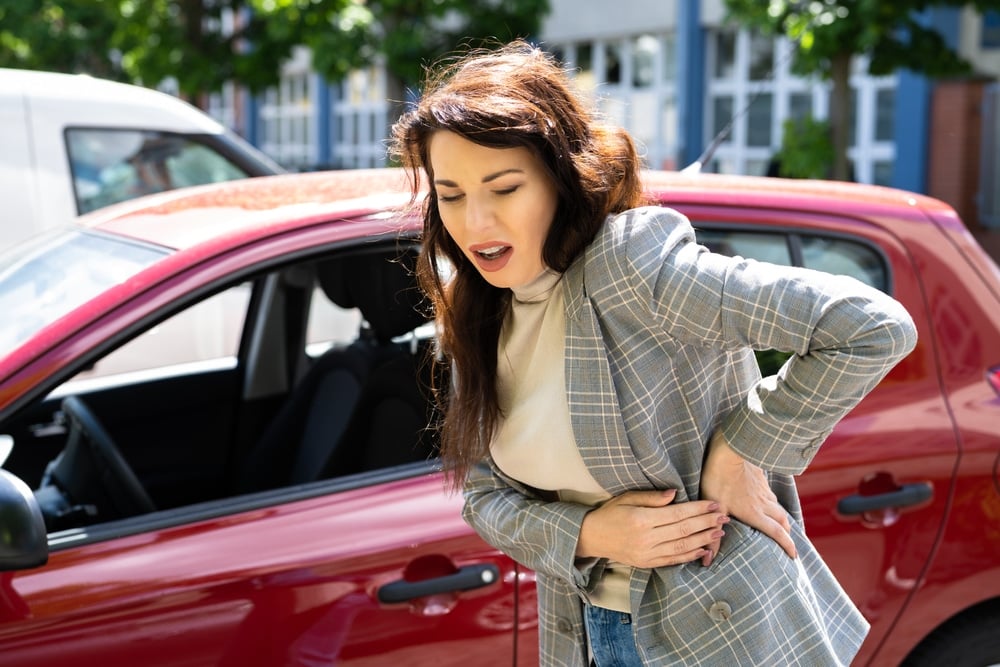
There are many types of medical conditions related to spinal injuries that can occur following an auto accident, but the seven most common are back strains and sprain, facet joint injuries, spondylolisthesis, vertebral fractures, discogenic pain, herniated discs, and degenerative spinal disorders. If you are experiencing neck and back pain after a car accident, understanding the symptoms of each can guide you to a pain management specialist for diagnosis and treatment.
Back Strains and Sprains
The overstretching of soft tissue, or tendons, in your back is called a strain. In contrast, a sprain is when the ligaments that connect bones and joints are damaged. Both can result in persistent pain and discomfort. Injuries to tendons and ligaments cannot be seen in medical imaging; however, they can be diagnosed and treated by a back pain doctor.
Facet Joint Injuries
Facet joints exist between bones in your spine and allow you to bend and move in different directions without causing injury. Any damage affects nerves in the joints and causes joint pain. You may feel external tenderness on your back, emanate pain, or muscle spasm as a result of facet joint injuries. More problems can occur if left untreated.
Spondylolisthesis
Spondylolisthesis occurs when a stress fracture displaces a vertebra that moves and causes compression on the spinal canal or nerves. The severity of the injury affects the level of pain that you experience. However, the common symptoms are pain and numbness in the back causing difficulty with walking.
Vertebral Fractures
Vertebral fractures are more commonly termed “broken back” and refer to the breaking, cracking, or damaging of any one or more of the 33 bones surrounding your spinal cord.
Some terms used to refer to lumbar or thoracic vertebrae fractures are:
- Flexion fractures, which are breaks that typically occur in the posterior or middle columns of the spine,
- A burst fracture occurs when vertebrae are crushed together, potentially causing the spread of bone fragments,
- A compression fracture refers to small breaks or cracks in bones that are caused by excessive pressure,
- Fracture-dislocation is a combination of any of the aforementioned fractures listed with the dislocation of one or more vertebrae.
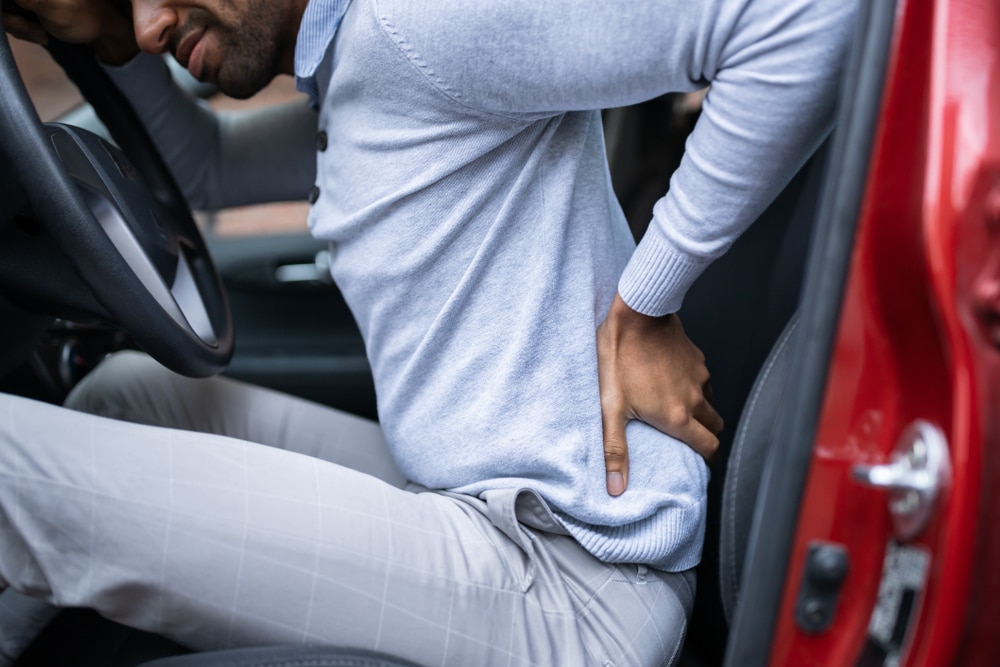
A doctor may use any of these terms to define a vertebral fracture. Worsening pain while standing or walking and limited spinal mobility are common symptoms.
Discogenic Pain
Discogenic pain is caused by spinal disc damage. It can cause many different kinds of discomfort and can be worsened or better by lying down. It often causes sharp or shooting pains in your feet, groin, buttocks, or legs. Any extended activity can make it feel worse. This form of neck and back pain after a car accident is difficult to diagnose without the help of a pain management specialist.
Herniated Discs
A herniated disc is the term used to describe the inner part of the disc pushing out and through the outer ring. It occurs when discs shift and compress the nerves in the spine. Doctors often refer to herniated discs as ruptured, slipped, or bulging. Symptoms include a burning sensation, numbness, and weakness felt throughout the body.
Degenerative Spinal Disorders
Degenerative spinal disorders typically occur months or even years after a traumatic spinal injury. The results are numerous.
Among the degenerative spinal disorders that can occur are:
- Foraminal stenosis
- Herniated discs
- Pinched nerves
- Osteoarthritis of the spine
- Spinal stenosis
- Bone spurs
- Sciatica
- Degenerative disc disease
Any of these may happen as your body ages in combination with degeneration. Degenerative spinal disorders can also worsen a health issue you did not previously know you had.
Common Symptoms of Potential Neck or Back Injury After an Auto Accident
Understanding the potential symptoms of a spinal injury after an auto accident can help you decide whether or not you need the help of a doctor and what kind of treatment might lessen your pain. Since your spinal column stretches from your neck all the way down your back, pain can occur in one or more areas, and symptoms can cause anything between slight discomfort and total debilitating pain.
If you were recently in an auto accident and are experiencing any of the following symptoms, you could be suffering from a spinal injury.
- Difficulty doing any physical activity caused by throbbing or pain when trying to do daily tasks.
- Muscle spasms can feel like a knot. They cause uncontrollable twitching of the muscle and can potentially tenderize the touch. Pain levels vary from mild to severe.
- Tingling or numbness in your extremities, including hands, arms, legs, and feet, can happen when muscles tense and pinch nerves.
- Burning pain can travel down your back and all the way to the back of your legs. Like neck and back pain after a car accident, it can be mild or severe.
- Sharp pain happens suddenly and usually occurs when you begin to walk or stand up after sitting for a long period of time.
- Stiffness is a common side effect of muscle tension that occurs during an auto accident. Stretching can help it go away quickly, but it may return throughout the day.
With or without any of the symptoms mentioned above, you may experience headaches, disorientation, and dizziness caused by whiplash. Facet injuries can cause pain in the shoulders. For a better understanding of your symptoms, you can find an interventional pain management specialist or back pain doctor in your area.
How Spine Injuries Are Diagnosed After an Auto Accident
Once you decide to see a physician about your neck or back pain, you may go through a series of tests to get to a diagnosis and recommended treatment. After reviewing the details of your accident and going over your medical history, your doctor will likely take images of your neck using X-ray, magnetic resonance imaging (MRI), or computed tomography (CT) scans. What methods are used depends on the nature of the accident and exactly where the injury or injuries occurred.
Treatments for Neck or Lower Back Pain Caused by Spinal Injury After A Car Wreck
Treatments for neck and lower back pain caused by spinal injury can range anywhere from physical therapy in less severe cases to surgery in more extreme cases. Below are the most common treatments prescribed by pain management doctors.
Medications
Ibuprofen and naproxen, which are over-the-counter anti-inflammatory drugs, are typically prescribed to manage pain, inflammation, and swelling. Muscle relaxants and stronger anti-inflammatory medications are reserved for severe pain. Doctors may also use injections of corticosteroids to treat a pinched nerve or inflammation in the spine. These trigger-point injections typically help to reduce pain for as little as a few days or as much as a few months. They are temporary, but they provide relief while your body heals from an injury.
Physical Therapy
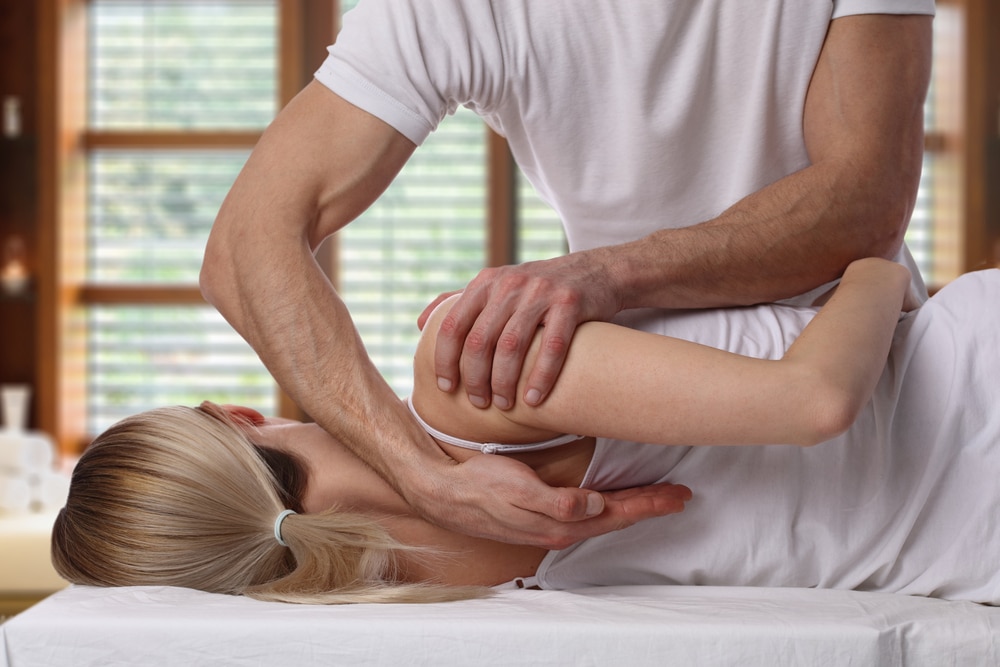
Physical therapy (PT) is one of the most common physical medicine treatments for neck and back pain after car accident. A pain management specialist or back pain doctor will generally prescribe physical therapy in tandem with other pain treatments. Physical therapists can help you improve strength and range of motion as you heal.
Other Non-Surgical Options
Heat and ice are common remedies for pain and swelling. Doctors sometimes recommend applying ice packs several times a day after an accident and then switching to heat packs to help soothe tense muscles. Additionally, some doctors may recommend more movement to help with the healing process. However, both of these non-surgical remedies depend on the type and severity of your injury, and you should only attempt treatments prescribed by a doctor.
Surgery
Surgery is not as common as the other treatments mentioned. However, it is typically an option for patients with long-lasting pain and discomfort. Spinal fusion is the most common surgery for discogenic pain. Intradiscal Electrothermal Therapy (IDET) is a minimally invasive spine surgery that helps fuse painful nerve endings, getting rid of discogenic pain.
Schedule an Appointment With an Auto Accident Doctor in New York, NY or New Jersey
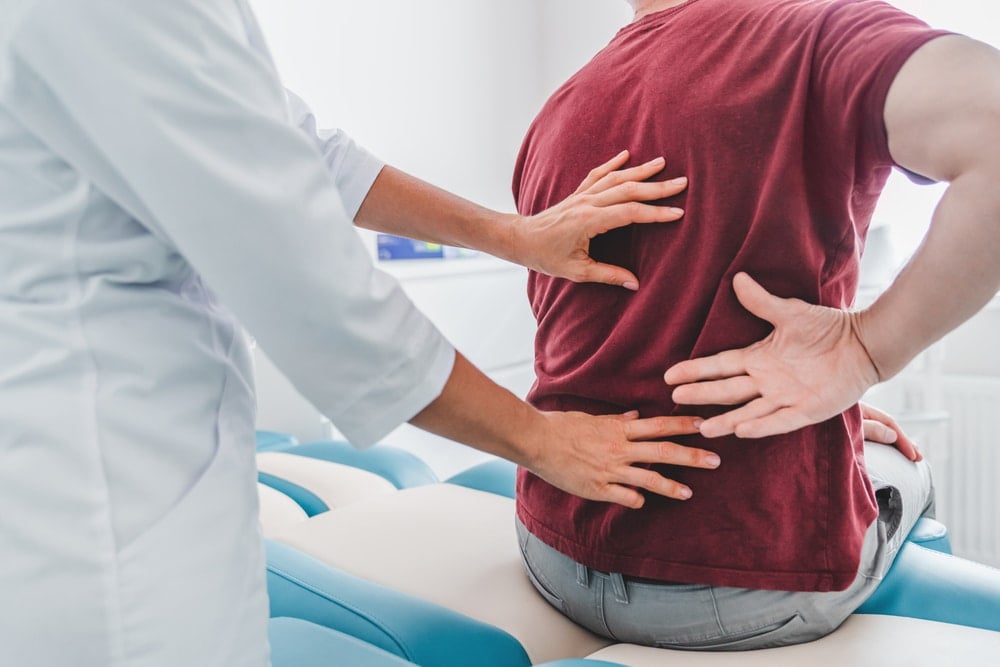
An auto accident doctor who understands common issues with neck and back pain after a car accident is an asset in the aftermath of a crash and can provide valuable professional medical advice and treatment options. Pain management specialists also know how to complete medical records with the necessary information to appease no-fault insurance claims.
No-Fault-Doctors is a free directory of health professionals in neurology, chiropractic, orthopedics, pain management, physical therapy, and more to help you resume a pain free life. To schedule an appointment with an experienced doctor in New York or New Jersey, or for general inquiries, call us at (888) 970-5065 or contact us here.
Sources:
https://academic.oup.com/tse/article/1/2/89/5618803
https://www.spineuniverse.com/conditions/back-pain/spine-injuries-car-accidents
